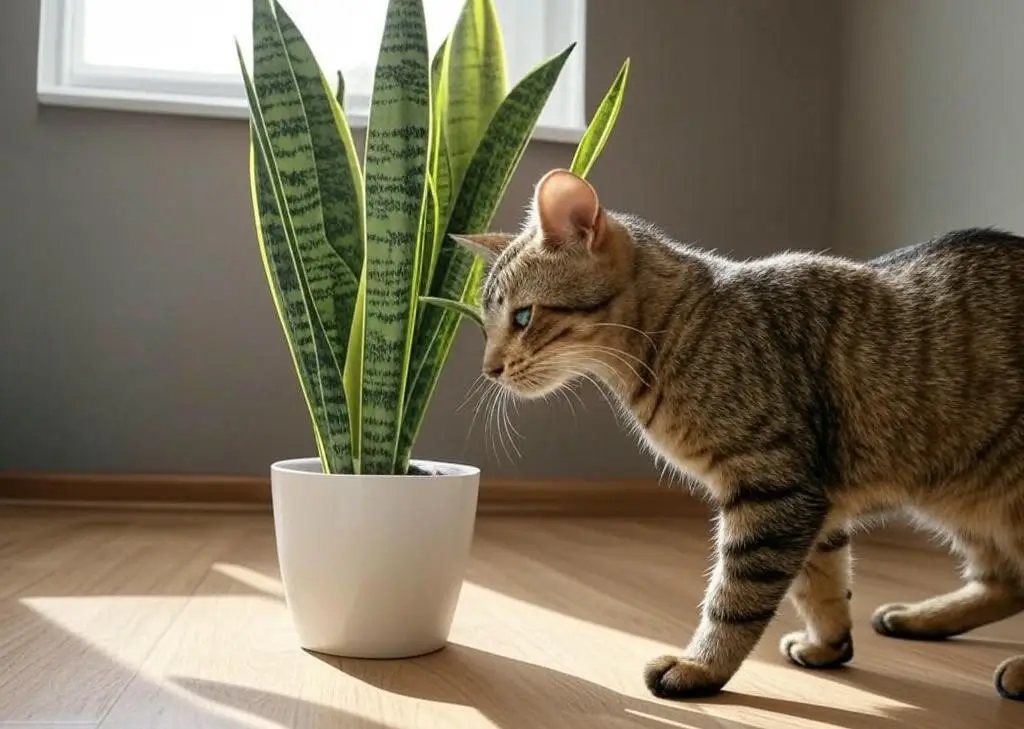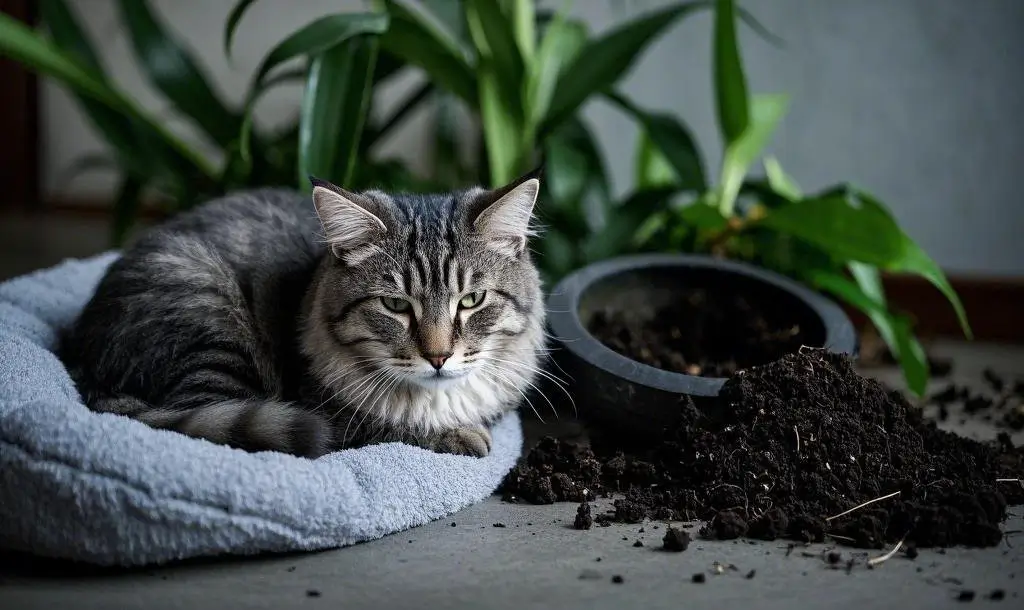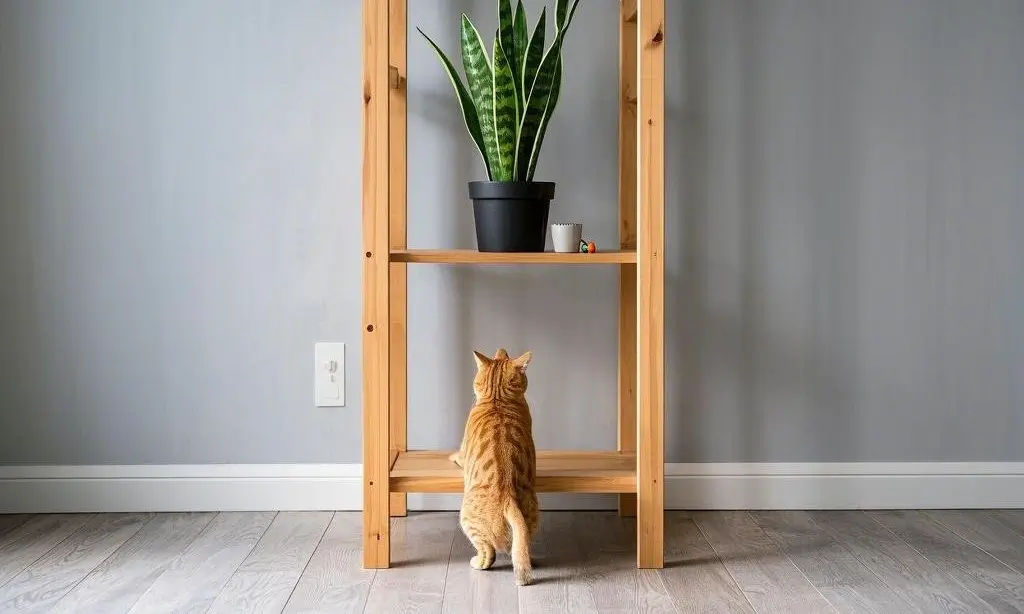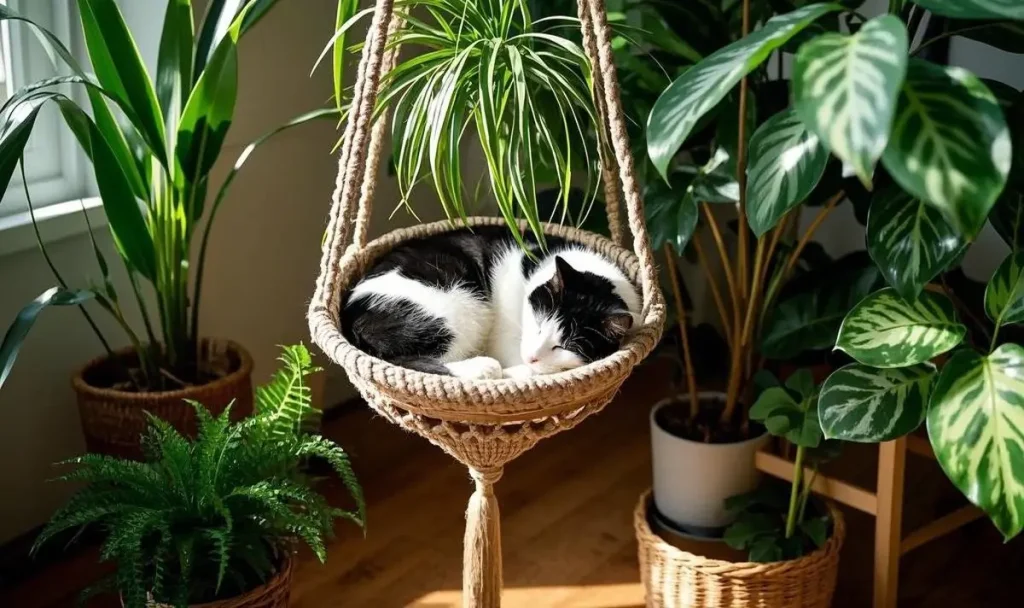Snake plants (Sansevieria trifasciata) are popular for their sleek look and low maintenance. However, as a cat owner, you may wonder: Are snake plants toxic to cats?
The answer is yes. Snake plants can be harmful to cats if ingested.
In this guide, I’ll break down the risks of snake plant poisoning in cats, key symptoms to watch for, and pet-safe plant alternatives for a worry-free home.

Why Are Snake Plants Poisonous to Cats?
Snake plants contain natural chemicals called saponins, which can irritate your cat’s digestive system. While these compounds help the plant defend itself from insects and pests, they can cause similar issues for your pets.
If you’re unsure, always check a plant’s toxicity before bringing it into your home.
What Happens if a Cat Licks a Snake Plant?
When a cat chews on a snake plant, or even licks it, the saponins can irritate their stomach and intestines. While snake plants aren’t usually deadly, eating or licking even a small amount can make your cat uncomfortable. Symptoms might include vomiting, diarrhea, and drooling.
According to the ASPCA’s list of toxic plants, saponins are toxic to cats, dogs, and horses.
How Likely Is It for Cats to Get Sick?
Cats are naturally curious, and some like to chew or lick plants. If you have a snake plant within their reach, there’s a good chance your cat might take a nibble or even a lick.
Even if they only ingest or lick a tiny piece, it’s enough to cause mild symptoms.
Signs of Snake Plant Poisoning in Cats
If your cat chews on a snake plant, you might notice the following symptoms:
Mild Symptoms
- Vomiting
- Diarrhea
- Drooling
Moderate Symptoms
- Loss of appetite
- Lethargy
- Swelling mouth or tongue
Severe Symptoms (Rare but possible)
- Difficulty breathing
- Dehydration
- Severe vomiting

When Should You Call the Vet?
If you notice severe symptoms or unusual behavior, contact your veterinarian immediately. It’s always better to be safe, even with mild symptoms. For more details on dealing with toxic plants, you can refer to Pet Poison Helpline’s guide on plant poisoning.
How to Protect Your Cat from Toxic Houseplants
There are plenty of ways to protect your cat from snake plants and other houseplants. Here are some simple but effective tips:
Move the Plant Out of Reach
Place your snake plants on high shelves, in hanging planters, or in rooms your cat doesn’t enter. Cats are great climbers, so make sure the spot is truly inaccessible.

Use Cat Deterrents
Spray your plants with a pet-safe deterrent spray. Many cats dislike the smell of citrus or vinegar, which can keep them away from your plants.
Offer Cat-Safe Plants
Give your cat safe plants to chew on, like wheatgrass or catnip. Having these options available can reduce their interest in your toxic plants.
Create a Cat-Friendly Environment
Make your home exciting for your cat by adding scratching posts, climbing trees, and toys. A happy and active cat is less likely to cause problems with your plants.
Cat-Safe Alternatives to Snake Plants
If you love the look of indoor plants but worry about your cat’s safety, there are plenty of pet-friendly options to choose from. Here are some cat-safe plants to consider:
Spider Plant
Spider plants are non-toxic to cats and are super easy to grow. They’re also low-maintenance and thrive in various light conditions.
Areca Palm
This elegant palm is safe for cats and adds a tropical feel to your home. They’re also easy to care for, making them perfect for busy plant owners.
Boston Fern
Boston ferns are lush and non-toxic to cats. They prefer humid environments, making them ideal for bathrooms or kitchens.
Parlor Palm
Parlor palms are elegant and cat-safe. They don’t need much attention, making them a great choice if you’re new to houseplants.
Calathea
Calathea plants are non-toxic to cats and come in a variety of stunning patterns and colors. They’re sure to brighten up any room.

First Aid Steps if Your Cat Chews on a Snake Plant
If your cat chews a snake plant, act fast:
Step 1: Remove Access
Move the plant out of reach.
Step 2: Check for Symptoms
Observe your cat closely for signs of poisoning, such as vomiting or drooling.
Step 3: Contact a Veterinarian
Call your vet or an animal poison control hotline for guidance. Provide details about your cat’s symptoms and how much of the plant they may have eaten.
Step 4: Follow Professional Advice
Your vet may recommend bringing your cat in for an exam or monitoring them at home. Follow all instructions carefully.
Why Cats Chew on Plants
Cats chew on plants for a variety of reasons. Understanding their behavior can help you prevent future incidents. Common reasons include:
Curiosity
Cats are naturally curious creatures and may explore plants by chewing on them.
Boredom
If your cat doesn’t have enough to do, they might turn to your plants for entertainment. Providing toys and interactive playtime can help.
Nutritional Needs
Some cats chew on plants to aid digestion or supplement their diet. Adding cat grass to their environment can satisfy this urge.
FAQs: Are Snake Plants Toxic to Cats?
Are All Snake Plant Varieties Toxic to Cats and Dogs?
Yes, all snake plant varieties (Sansevieria) are toxic to cats and dogs. They contain saponins, which can cause symptoms like nausea, vomiting, and drooling if ingested. Keep them out of reach of pets.
Are Snake Plants Dangerous to Dogs Too?
Yes, snake plants can also be toxic to dogs. The symptoms are similar to those in cats, including vomiting, diarrhea, and drooling.
If you’re concerned about your dog’s safety around snake plants, check out our detailed guide on Snake Plants Toxicity to Dogs for more information.
How Do I Treat My Cat if They Chew on a Snake Plant?
First, remove the plant and check your cat for symptoms. Then contact your veterinarian for advice. Do not attempt to induce vomiting unless instructed by a professional.
Can Eating Snake Plants Kill Cats?
It’s very rare for a cat to die from eating a snake plant. Most cases involve mild to moderate symptoms. However, it’s still important to seek veterinary advice if your cat ingests any part of the plant.
What Other Common Houseplants Are Toxic to Cats?
Many popular houseplants can be toxic to cats, including:
- Pothos
- Philodendron
- Dieffenbachia
- Peace Lily
- Aloe Vera
What Are the Benefits of Cat-Safe Plants?
Cat-safe plants let you enjoy the beauty of indoor greenery without worrying about your pet. Plus, some of them, like cat grass, can even benefit your cat’s health.
Final Thoughts
Snake plants (mother-in-law’s tongue) are mildly toxic to cats. They are not pet friendly but with the right precautions and safe plant alternatives, you can enjoy a beautiful home without putting your cat at risk.
If you suspect your cat has ingested a snake plant, monitor them closely and consult a veterinarian if symptoms appear.
By choosing cat-safe plants, like spider plants and Boston ferns, you can enjoy a green environment without worrying about houseplants poisonous to cats.




